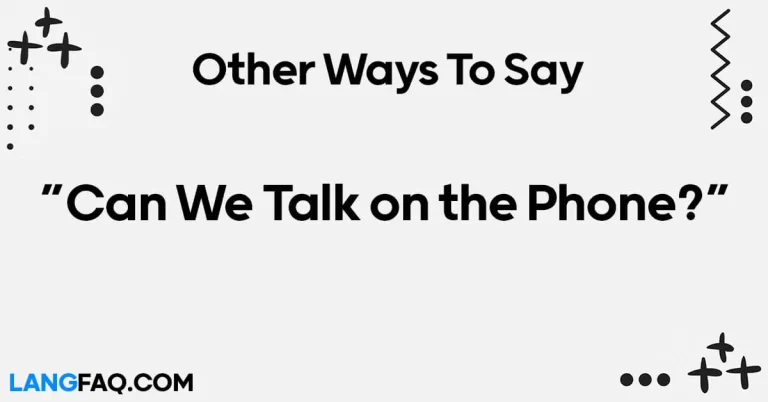In a world buzzing with activity, ensuring plans remain intact is paramount. “Are We Still On?” encapsulates the need for confirmation in our fast-paced lives. This article explores 12 unique approaches to seek that assurance, ranging from direct inquiries to clever, humorous tactics.
12 Other Ways to Ask “Are We Still On?”
Here are 12 alternative ways to ask, “Are We Still On?”
- Are our plans still a go?
- Shall we proceed with our arrangement?
- Is our meeting still in the books?
- Do we have a date tonight?
- Are we sticking to our original plan?
- Should I mark our appointment as confirmed?
- Is our get-together still happening?
- Are you still up for our scheduled activity?
- Have there been any changes to our plans?
- Are we on for our agreed-upon time?
- Should I keep our arrangement in my calendar?
- Is everything still set for our meeting?
| Expression | Meaning | Example |
|---|---|---|
| Are our plans still a go? | Confirming if the plans are still happening | “Hey, are our dinner plans still a go for tonight?” |
| Shall we proceed with our arrangement? | Seeking confirmation to continue with the plans | “Should we proceed with our coffee arrangement?” |
| Is our meeting still in the books? | Checking if the scheduled meeting is still valid | “Is our team meeting still in the books for 3 PM?” |
| Do we have a date tonight? | Inquiring about the status of an evening plan | “Do we have a date tonight, or did plans change?” |
| Are we sticking to our original plan? | Confirming adherence to the initial plan | “Are we sticking to our original hiking plan?” |
| Should I mark our appointment as confirmed? | Seeking permission to confirm an appointment | “Should I mark our appointment as confirmed?” |
| Is our get-together still happening? | Verifying the occurrence of a social gathering | “Is our family get-together still happening this weekend?” |
| Are you still up for our scheduled activity? | Checking if the other person is still interested | “Are you still up for our movie night on Saturday?” |
| Have there been any changes to our plans? | Inquiring about potential alterations in plans | “Have there been any changes to our travel plans?” |
| Are we on for our agreed-upon time? | Confirming the agreed-upon meeting time | “Are we on for our conference call at 2 PM?” |
| Should I keep our arrangement in my calendar? | Seeking confirmation to maintain plans | “Should I keep our lunch arrangement in my calendar?” |
| Is everything still set for our meeting? | Verifying the preparedness for a scheduled meeting | “Is everything still set for our client meeting?” |
Navigating plans and ensuring clarity is a nuanced process. These alternative expressions offer a variety of ways to confirm arrangements, catering to different contexts and communication styles. Incorporate these phrases to enrich your communication toolkit and enhance your ability to confirm plans effectively.
Is It Correct to Say “Are We Still On?”?
Absolutely, “Are We Still On?” is a grammatically correct and commonly used phrase in English. This question is often employed to confirm plans or arrangements previously made with someone. Let’s break down why this phrase is grammatically correct and how it is typically used.
Grammar and Structure:
- Subject-Verb Agreement: The subject “we” agrees with the auxiliary verb “are,” making it grammatically accurate.
- Question Structure: It follows the standard structure for forming yes-no questions in English, which is to invert the subject and auxiliary verb.
Usage:
- Confirming Plans: This phrase is commonly used to seek confirmation about previously made plans. For example, if you and a friend have agreed to meet for dinner, you might send a text saying, “Hey, are we still on for dinner tonight?”
- Informal Tone: It maintains an informal tone, making it suitable for use with friends, family, or casual acquaintances. However, it might be considered too informal for certain professional settings.
Variations:
- Politeness Adjustments: Depending on the level of formality or politeness desired, variations like “Are we still scheduled?” or “Are we still confirmed?” can be used.
- Contextual Adaptations: In some situations, the phrase may be slightly modified based on the context, such as “Are we still meeting at the agreed-upon time?”
Common Scenarios:
- Friendship and Social Plans: Commonly used among friends to confirm social gatherings or events.
- Professional Engagements: While it might be used in more relaxed work environments, for formal or business settings, slight modifications for added formality may be preferred.
Professional Mail Example With “Are We Still On?”
Subject: Confirmation for Tomorrow’s Meeting
Dear [Recipient’s Name],
I trust this email finds you well. As our scheduled meeting approaches, I wanted to touch base and confirm our plans. Are we still on for our meeting tomorrow at 10 AM?
I understand that schedules can change, and I appreciate your time. If there are any adjustments needed or if you require additional information before our meeting, please feel free to let me know.
Looking forward to our discussion and collaboration.
Best regards,
[Your Full Name] [Your Position] [Your Company] [Your Contact Information]
1. Are our plans still a go?
In the realm of casual but reliable communication, “Are our plans still a go?” is a friendly yet direct way to confirm arrangements. This phrase is versatile, fitting seamlessly into both personal and professional contexts.
Example Scenario: Informal Context (Friends) You’ve planned a weekend hiking trip with friends. A few days before, you want to confirm if everyone is still onboard.
Example Sentence: “Hey folks, with the weekend approaching, are our plans still a go for the hiking trip?”
Variations:
- Colleagues: “Team, considering our deadlines, are our plans still a go for the project meeting?”
- Family: “Mom, is our family dinner still a go for this Saturday?”
Email Sample:
Subject: Confirmation for Weekend Hiking Trip
Hey Team,
As the weekend is approaching, I wanted to check in and see if our plans for the hiking trip are still a go. Excited to spend some quality time together!
Best, [Your Name]
Dictionary Insight: The phrase “still a go” is an informal way to express readiness or confirmation, often used in a relaxed setting to confirm plans.
2. Shall we proceed with our arrangement?
For a touch of formality without sounding overly rigid, “Shall we proceed with our arrangement?” is a courteous way to seek confirmation. It fits well in professional or more reserved social settings.
Example Scenario: Formal Context (Colleagues) You’re coordinating a project meeting with colleagues, and you want to confirm their availability.
Example Sentence: “Team, considering our timelines, shall we proceed with our arrangement for the project meeting on Tuesday?”
Variations:
- Mentor-Mentee: “Considering your workload, shall we proceed with our mentoring session this week?”
- Friends: “Hey, given our schedules, shall we proceed with our movie night on Friday?”
Email Sample:
Subject: Confirmation for Project Meeting
Dear Team,
I hope this email finds you well. Regarding our upcoming project meeting, shall we proceed with our scheduled arrangement on Tuesday?
Best regards, [Your Name]
Dictionary Insight: Using “shall” adds a level of formality to the phrase, making it suitable for professional or reserved social settings.
3. Is our meeting still in the books?
A phrase blending professionalism with a touch of informality, “Is our meeting still in the books?” is perfect for confirming scheduled meetings or appointments.
Example Scenario: Formal Context (Work) You have a business meeting scheduled with a client, and you want to ensure the meeting is still confirmed.
Example Sentence: “Hello, considering our agenda, is our meeting still in the books for 2 PM tomorrow?”
Variations:
- Friends: “Hey, with our busy schedules, is our coffee catch-up still in the books for this weekend?”
- Doctor’s Appointment: “Given your availability, is our appointment still in the books for next Monday?”
Email Sample:
Subject: Confirmation for Tomorrow’s Meeting
Dear [Client’s Name],
I trust this email finds you well. I wanted to confirm if our meeting is still in the books for 2 PM tomorrow as scheduled.
Best regards, [Your Name]
Dictionary Insight: The phrase “in the books” implies that the meeting or appointment is officially scheduled or recorded, adding a sense of formality to the confirmation.
4. Do we have a date tonight?
Injecting a hint of playfulness into confirmation, “Do we have a date tonight?” is perfect for social engagements or romantic settings, providing a lighthearted approach.
Example Scenario: Casual Context (Friends or Romantic Partner) You’ve planned a dinner date with a friend or a partner, and you want to confirm the date.
Example Sentence: “Hey there, excited for tonight! Do we have a date tonight for dinner at our favorite spot?”
Variations:
- Friends: “Looking forward to our movie night! Do we have a date tonight for some film fun?”
- Romantic Setting: “With the candles and dinner reservations, do we have a date tonight, my love?”
Email Sample:
Subject: Excitement for Tonight
Hi [Friend/Partner’s Name],
Anticipating a great evening! Just checking in, do we have a date tonight for dinner at our favorite spot?
Cheers, [Your Name]
Dictionary Insight: Using “date” in a non-romantic context adds a playful and affectionate tone, making the confirmation enjoyable.
5. Are we sticking to our original plan?
When seeking confirmation while subtly emphasizing the adherence to the initial plan, “Are we sticking to our original plan?” strikes a balance between assertive and amicable.
Example Scenario: Formal Context (Work) You’re part of a project team, and there have been discussions about potential changes. You want to confirm if the original plan is still intact.
Example Sentence: “Team, considering recent discussions, are we sticking to our original plan for the product launch?”
Variations:
- Friends: “Given the weather forecast, are we sticking to our original plan for the beach day?”
- Family Gathering: “With everyone’s availability, are we sticking to our original plan for the family reunion?”
Email Sample:
Subject: Confirmation for Product Launch Plan
Dear Team,
As we approach the launch date, I wanted to confirm if we are sticking to our original plan or if there are any adjustments.
Best, [Your Name]
Dictionary Insight: The phrase “sticking to” implies commitment and consistency, making it effective when emphasizing the preservation of the original plan.
6. Should I mark our appointment as confirmed?
Bringing a formal touch to confirmation, “Should I mark our appointment as confirmed?” is a courteous inquiry suitable for professional or scheduled settings.
Example Scenario: Formal Context (Appointments) You have a professional appointment, and you want to confirm its status.
Example Sentence: “Hello, considering your schedule, should I mark our appointment as confirmed for next week?”
Variations:
- Colleagues: “Given the project timelines, should I mark our project review as confirmed for Thursday?”
- Friends: “Excited for our catch-up! Should I mark our coffee date as confirmed for this Friday?”
Email Sample:
Subject: Confirmation for Next Week’s Appointment
Dear [Recipient’s Name],
I trust this message finds you well. Regarding our upcoming appointment, should I mark it as confirmed for next week?
Best regards, [Your Name]
Dictionary Insight: Using “mark” adds a level of formality to the confirmation, making it suitable for professional or scheduled situations.
7. Is our get-together still happening?
For casual social settings, “Is our get-together still happening?” is a friendly and relaxed way to confirm plans with friends or family.
Example Scenario: Casual Context (Friends or Family) You’ve planned a casual get-together, and you want to ensure everyone is still on board.
Example Sentence: “Hey team, with the weekend around the corner, is our get-together still happening?”
Variations:
- Family: “With everyone’s availability, is our family game night still happening this Saturday?”
- Friends: “Excited for our movie night! Is our get-together still happening this Friday?”
Email Sample:
Subject: Excitement for This Weekend
Hi All,
Looking forward to the weekend! Just checking in, is our casual get-together still happening?
Cheers, [Your Name]
Dictionary Insight: The term “get-together” implies a casual and informal gathering, making it suitable for friendly or family-oriented contexts.
8. Are you still up for our scheduled activity?
Perfect for confirming plans with a touch of consideration, “Are you still up for our scheduled activity?” acknowledges the other person’s commitment.
Example Scenario: Formal Context (Colleagues) You’ve planned a team-building activity at work, and you want to ensure everyone is still interested.
Example Sentence: “Team, considering our schedules, are you still up for our scheduled team-building activity?”
Variations:
- Friends: “Excited for our hiking trip! Are you still up for our adventure this weekend?”
- Colleagues: “With the workload, are you still up for our scheduled brainstorming session?”
Email Sample:
Subject: Confirmation for Team-Building Activity
Dear Team,
I hope this email finds you well. Regarding our scheduled team-building activity, are you still up for it considering our current workload?
Best, [Your Name]
Dictionary Insight: The phrase “still up for” implies an acknowledgment of the other person’s prior commitment, making it considerate and suitable for various situations.
9. Have there been any changes to our plans?
When navigating potential alterations, “Have there been any changes to our plans?” is a diplomatic way to confirm while opening the door for discussion.
Example Scenario: Formal Context (Work) Plans for a project have been evolving, and you want to confirm if there are any changes.
Example Sentence: “Team, with recent developments, have there been any changes to our plans for the product launch?”
Variations:
- Friends: “Considering the weather forecast, have there been any changes to our plans for the beach day?”
- Family Gathering: “Given everyone’s schedule, have there been any changes to our plans for the family reunion?”
Email Sample:
Subject: Inquiry about Potential Changes
Dear Team,
I trust this email finds you well. With recent developments, I wanted to check if there have been any changes to our plans for the upcoming product launch.
Best regards, [Your Name]
Dictionary Insight: The question invites open communication about alterations, making it a diplomatic and versatile way to confirm plans.
10. Are we on for our agreed-upon time?
When emphasizing adherence to the agreed-upon schedule, “Are we on for our agreed-upon time?” is assertive yet collaborative.
Example Scenario: Formal Context (Work) You’ve scheduled a conference call with your team, and you want to confirm everyone is aware of the agreed-upon time.
Example Sentence: “Hello Team, considering our schedules, are we on for our agreed-upon time for the conference call at 2 PM?”
Variations:
- Friends: “Looking forward to our catch-up! Are we on for our agreed-upon time for coffee at 10 AM?”
- Colleagues: “With the project deadlines, are we on for our agreed-upon time for the project review at 3 PM?”
Email Sample:
Subject: Confirmation for Conference Call
Dear Team,
I hope this message finds you in good spirits. Regarding our upcoming conference call, are we on for our agreed-upon time at 2 PM?
Best regards, [Your Name]
Dictionary Insight: The term “agreed-upon time” emphasizes collaboration and agreement, making it suitable for formal contexts.
11. Should I keep our arrangement in my calendar?
A polite inquiry with a touch of formality, “Should I keep our arrangement in my calendar?” is perfect for confirming plans without making assumptions.
Example Scenario: Formal Context (Appointments) You’ve scheduled a meeting with a client, and you want to ensure the arrangement is still confirmed.
Example Sentence: “Dear [Client’s Name], considering your schedule, should I keep our arrangement in my calendar for next week?”
Variations:
- Friends: “Looking forward to our movie night! Should I keep our arrangement in my calendar for this Friday?”
- Colleagues: “Given the workload, should I keep our project review in my calendar for Thursday?”
Email Sample:
Subject: Inquiry about Calendar Arrangement
Dear [Recipient’s Name],
I trust this message finds you well. Regarding our upcoming arrangement, should I keep it in my calendar as planned?
Best regards, [Your Name]
Dictionary Insight: The question offers a considerate way to confirm plans without assuming the other person’s schedule.
12. Is everything still set for our meeting?
Closing with a comprehensive and all-encompassing phrase, “Is everything still set for our meeting?” is a catch-all for confirming any type of arrangement.
Example Scenario: Formal Context (Work) You’ve scheduled a meeting with stakeholders, and you want to ensure all aspects are in place.
Example Sentence: “Stakeholders, considering our agenda, is everything still set for our meeting next week?”
Variations:
- Friends: “Hey team, with our plans in mind, is everything still set for our weekend getaway?”
- Family Gathering: “Given everyone’s availability, is everything still set for our family dinner this Saturday?”
Email Sample:
Subject: Final Confirmation for Next Week’s Meeting
Dear Stakeholders,
As we approach our scheduled meeting, I wanted to confirm if everything is still set as planned. Your confirmation is greatly appreciated.
Best regards, [Your Name]
Dictionary Insight: Using “everything still set” ensures a thorough confirmation, leaving no room for uncertainty and adding a sense of finality to the inquiry.
FAQs
1. How do I handle last-minute cancellations gracefully?
- Approach the situation with understanding and flexibility. Express disappointment if necessary, but avoid assigning blame. Focus on finding alternative plans or rescheduling.
2. Is it appropriate to confirm plans for casual hangouts with friends?
- Yes, it is. Even for informal gatherings, confirming plans ensures everyone is on the same page. It helps in avoiding misunderstandings and ensures a smoother experience.
3. What if someone consistently avoids confirming plans?
- Address the issue openly but tactfully. Communicate the importance of confirmation for better coordination and express any concerns or challenges they might be facing.
4. Can I use emojis when confirming plans?
- Emojis can add a friendly touch, especially in casual settings. However, be mindful of the context and the nature of your relationship with the person involved.
5. How can I confirm plans without sounding too persistent?
- Space out your confirmation inquiries, and vary your approach. Use a mix of direct questions, polite inquiries, and non-verbal cues to avoid coming across as overly persistent.
6. Is it acceptable to confirm plans for a business meeting?
- Absolutely. Professionalism demands clarity in communication. Confirming plans for business meetings ensures everyone is prepared and contributes to a productive work environment.
Conclusion
In a world filled with uncertainties, the ability to confirm plans is a valuable skill. By adopting diverse and nuanced approaches, one can navigate the complexities of confirmation, ensuring that when you ask, “Are We Still On?” the answer is a resounding yes.







